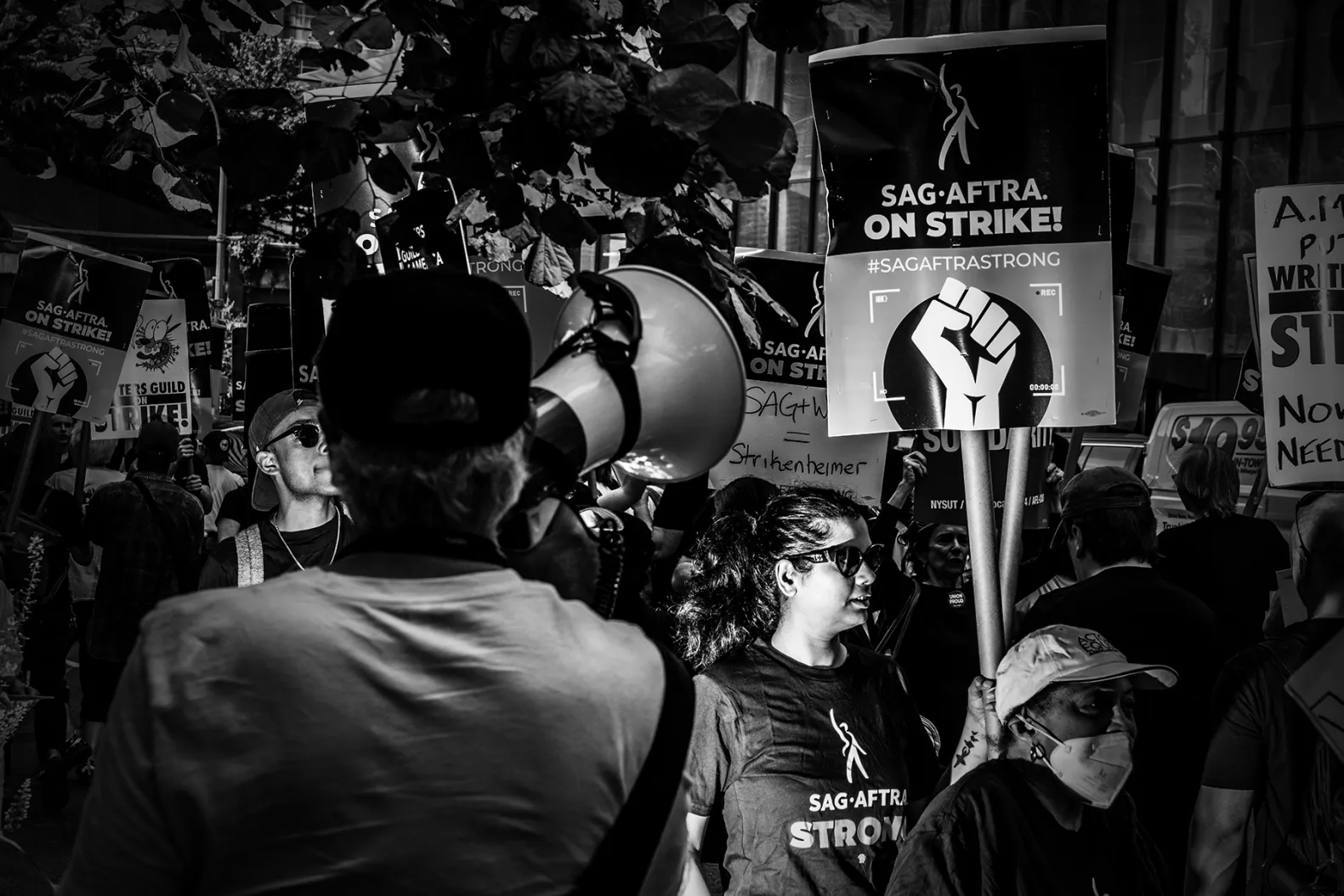


Nandini Bapat wasn’t raised a quitter. She began acting in 2012 and has since juggled full-time gigs while landing small roles on Fox’s Scream Queens, HBO’s Barry, and Apple TV’s Physical. And after last year’s nearly four-month-long actor’s strike and work stoppage, she still believes her acting career is worth fighting for.
So when she landed her first post-strike job on a Warner Bros. production and a studio contract asked her to consent to the creation of her digital replica, she wrote “no” and headed for hair and makeup. After shooting her scenes for the day, she says a Warner Bros. representative called her agent and threatened to send her home if she didn’t consent to the provision around artificial intelligence. (Warner Bros. declined to comment on Bapat’s claims. A source familiar with the situation tells Rolling Stone, “Casting considerations vary by specific roles and productions,” and notes that “a wide range of roles … across the industry” may include employment-based digital replicas.)
“I felt the entire force of Warner Brothers staring down on me to say yes,” Bapat tells Rolling Stone.
Last July 14, actors began marching on nationwide picket lines for fair compensation, residual increases, and protections around artificial intelligence. After 118 days on strike and 35 days of volatile bargaining in negotiating rooms, members of the Screen Actors Guild and American Federation of Television and Radio Artists (SAG-AFTRA) ratified a multiyear TV and theatrical contract with Hollywood studios and streamers in December. Described by the Alliance of Motion Picture and Television Producers as the “biggest contract-on-contract gains” in SAG-AFTRA’s history, the new agreement allowed actors to walk away with a higher minimum wage, residual increases including a bonus structure that rewards successful streaming programs, and provisions that require consent and compensation for the use of AI replicas. Yet nearly a year after the strike began, according to interviews with more than a dozen SAG-AFTRA members, some actors still find the use of digital technology, particularly the creation of digital replicas, a potent threat to their livelihoods.
Bapat had been overjoyed to get back to work, landing a gig with a supportive cast on one of her favorite shows. (Bapat declined to name the series in fear of retaliation.) But her light dimmed when consenting to digital replicas became a condition of employment. Bapat recalls her complaint was escalated to Warner Bros. legal team, who she says at first refused to change the agreement’s boilerplate language.
“My reps were basically saying, ‘If we walk away from this right now, that’s going to burn relationships with this casting office,’” Bapat says.
WHEN SAG-AFTRA FIRST struck a deal last November, Duncan Crabtree-Ireland, the union’s national executive director and chief negotiator, told Rolling Stone that studios and streamers could no longer put a boilerplate provision around digital replicas in their contracts. “Whenever one of our companies is going to make a replica of an actor, using digital technology, including AI, they have to actually disclose to the actor exactly what that replica is going to be used for. And the actor has a right to say yes or no to that,” Crabtree-Ireland said. “And if they say yes, they get compensated for it, none of which existed before.”
An “employment-based digital replica,” as AI recreations are often called in employment contracts, uses digital technology to clone an actor’s voice and likeness. Before an employment-based digital replica can be created, according to the terms SAG-AFTRA negotiated in the strike resolution, a producer must provide a “reasonably specific description” on how it will be used, which Bapat alleges Warner Bros. did not do. (Warner Bros. declined to comment on AI language within their contracts.)
“I do this work because I love it and because I have fun with it, and giving my consent to have a computer do my job for me kind of defeats the purpose,” Bapat says.
After back-and-forth discussions between her agent, union representatives, and Warner Bros. lawyers, Bapat says the studio agreed to amend the AI contractual language and compensate her for the days spent on set, but it’s unclear if other actors on the project were given the same addendum. And Bapat stresses that this battle is not one she could have undertaken on her own: “At the end of the day, if SAG is not behind me, I am one person against a giant, mighty force that will crush me like a bug under their foot.”
Marie Fink, who has performed stunts for the likes of Shailene Woodley, Cobie Smulders, and Sigourney Weaver, was hired in April for the third season of The Sex Lives of College Girls. Like Bapat, Fink says she was asked to sign a document permitting the creation of digital replicas of herself and refused. (A source familiar with Warner Bros. productions tells Rolling Stone the studio has not conducted replica scans on The Sex Lives of College Girls.) Fink had performed stunts on the series prior to the strike and says AI replicas were not part of her previous contract.
“I told the Warner Brothers [representative] that I’m afraid of retaliation, like I could never work for the show again, for this coordinator again, or even for Warner Brothers,” says Fink, who adds that she’s “made my living” doing Warner Bros. movies. While Fink claims the representative assured her the studio would “never do that” and that she’d surely be asked back to the project, she says, “I have not worked on the show since. I’ve not been requested.”
Although Fink was paid for coming to set that day, she says she won’t receive future residual payments for that work and that it won’t be counted toward contributions to her health and pension.
According to a source with knowledge of Warner Bros. TV productions, the studio has not received any grievance notices from SAG-AFTRA. That source adds that the company “complies with all SAG-AFTRA rules, including the new guidelines set forth by the latest 2023 agreement that pertain to employment-based digital replicas,” and that Warner Bros. “take[s] this responsibility very seriously.”
Since the actors’ union struck the November deal, stunt performers have been especially concerned about the limitations of the new contract’s AI provisions. After all, if high-stakes car flips and complex combat scenes can be created with AI, who needs stunt doubles? SAG-AFTRA national board member Shaan Sharma, who has been a vocal critic of the AI provisions the union agreed to, says stunt performers are particularly vulnerable because producers can resort to replicas whenever a stunt double is doing something that could put their own life in danger, thereby significantly reducing liability costs.
To make matters worse, opportunities for work have been few and far between since the strike ended. In 2023, new and returning programs had already plunged by 21 percent, in part due to the twin labor strikes, according to the 2023 Year-End Film and TV Report released by Luminate in January. And in the first quarter of this year, both film and TV projects declined by about seven percent compared to the same time period of 2023, according to research platform ProdPro. Feature films also experienced a 24-percent drop in production compared to the previous year, according to ProdPro.
“The people that double the A-list actors on all of their runs are working days on television shows, so it’s pretty slow,” Fink says, referring to stunt performers who’ve picked up episodic work to make up for the lack of big-budget, feature film gigs. “If you’re on the run of [a] feature, you’re not trying to get days on television shows.”
DIGITAL HUMANS ARE NOT a new invention, but the emergence of the technology has not been without controversy. In 2016’s Rogue One: A Star Wars Story, Lucasfilm producers used existing footage of the actor Peter Cushing, who had been dead for more than 20 years, to create a digital replica of him as Grand Moff Tarkin, from 1977’s Star Wars: Episode IV – A New Hope. Though the project was undertaken with the permission of Cushing’s estate, many decried the move as an ethical violation. The Huffington Post called it “sickening” and “a giant breach of respect for the dead.” Following the June 26 trailer release for the time-jumping Robert Zemeckis drama Here, which used generative AI tools to de-age Tom Hanks and Robin Wright, the BBC called the technology “unsettling” and a threat to the careers of young performers. Digital technology has also been used in less obvious ways in recent years — for example, to fill the audiences in Prime’s rock & roll drama Daisy Jones & The Six and the football stadium in Apple TV’s Ted Lasso with virtual avatars.
For actor and filmmaker Justine Bateman, who served as a SAG-AFTRA AI advisor in 2023 and has been outspoken about the perils the technology poses to working actors, digital scans have only worsened job scarcity in Hollywood. “It’s a replacement, insultingly assembled with human effort,” Bateman says.
Under SAG-AFTRA’s new TV and theatrical contract, even if an actor is deceased, their heir or a union representative may grant consent to create a digital replica. Artificial intelligence startup ElevenLabs announced in early July that fans of Judy Garland, James Dean, Sir Laurence Olivier, and Burt Reynolds can now listen to those Hollywood stars narrate books. (ElevenLabs reached agreements with the estates of the deceased actors.)
“All the dead actors are always available, via a digital replica of them,” Bateman says. “So for actors, your odds of getting a job just went way down. The competition just increased tenfold, a hundredfold.”
The rising threat is enough of a concern that even members of Congress have tried to tackle it. Last year, a bipartisan coalition introduced the Nurture Originals, Foster Art, and Keep Entertainment Safe Act (NO FAKES) aimed at protecting actors, musicians, and ordinary people from the creation of unauthorized digital replicas. (Furthermore, a bipartisan group of U.S. House lawmakers introduced a similar bill, the No AI Fraud Act, in January, which defends Americans’ right to their individual likeness and voice against AI-generated clones or deepfakes.)
Crabtree-Ireland counters that the march of technology is inevitable, and the union’s aim in its strike-ending deal is to empower its members by requiring informed consent and fair compensation for digital scans and replication. “There are folks out there who wish that we lived in a world where we could simply prohibit digital replication completely,” Crabtree-Ireland tells Rolling Stone. “But that’s obviously not a realistic position. It wasn’t a realistic position for us to take prior to bargaining or something that we could have achieved even after many months of being on strike with the companies.”
Crabtree-Ireland adds that if a production violates SAG’s 2023 contract, the union’s contract departments and field representatives immediately address the issue and instruct production companies to modify their contracts.
“We did receive a few reports of companies attempting to demand consent for digital replication as sort of a standard practice across all of their projects,” Crabtree-Ireland says, while declining to name the specific companies. “That was brought to our attention by several performers, and we immediately went to those companies and reminded them of how that’s not something that they’re permitted to do under the contract.”
Crabtree-Ireland notes that there hasn’t been a rush to implement an extensive amount of digital replication since the November deal: “It’s not like a light switch where it was flipped on and all of a sudden everything is being done using AI.” Rather, he says, “there’s a gradual increase in the use of the technology” that is, to his knowledge, “in accordance with the rules that we negotiated for.”
SAG national board member Sharma, meanwhile, along with other performers, has been developing an AI rider to the existing 2023 contract that tightens existing AI protections. With SAG-AFTRA’s TV and theatrical contract effective through June 2026, Sharma says he’s pushing against the replacement of performers.
“I hear [performers] saying ‘survive to ’25’ which makes me really sad, because people have already been through so much for the last five years that I want people to be thriving,” Sharma says. “We all need to continue to support each other and help us sustain each other through these challenging times. It’s probably one of the hardest times in history to be a performer, especially one that is not in a position where they are able to sustain themselves.”
Some performers are trying to remain optimistic. Duncan Anderson, who was recently hired as a day player on The Sex Lives of College Girls and consented to the creation of digital replicas, believes AI could never replace human storytelling.
“Do I think it’s going to be a life-changer, and do I think it’s going to take away my job as an actor, as an artist? I don’t think so,” Anderson says. “Humans are going to find a way to adapt through it.”



Senators Press Pentagon for Answers on Rash of Overdose Deaths

BTS’ Label Says They’ve Filed a Criminal Complaint Against Internet Troll Spreading ‘Ill-Intentioned Rumor’

Conservatives Are Melting Down Because Lizzo Played James Madison’s Crystal Flute

How to Help Hurricane Ian Victims in Florida, Puerto Rico, Cuba, and Dominican Republic
When he headlines London’s O2 arena this August, that’s exactly what he’ll be doing. “I want [fans] to come and see a dream come true,” he says. “I will give everything I have, and I will just do my best. I will make everybody proud.”
Before we part ways, I ask Asake what he imagines the future holds. “Only God knows the future, my brother,” he says. “But the future is bright. There is light in the future.”

© Copyright Rolling Stone Africa 2024. Rolling Stone Africa is published by Mwankom Group Ltd under license from Rolling Stone, LLC, a subsidiary of Penske Media Corporation.
By providing your information, you agree to our Terms of Use and our Privacy Policy. We use vendors that may also process your information to help provide our services.
By registering for our sites and services, you agree to our Terms of Service (including, as applicable, the mandatory arbitration and class action waiver provisions) and our Privacy Policy.
We use vendors that may also process your information to help provide our services.
This site is protected by reCAPTCHA and the Google Privacy Policy and Terms of Service apply.
By providing your information, you agree to our Terms of Use and our Privacy Policy. We use vendors that may also process your information to help provide our services.